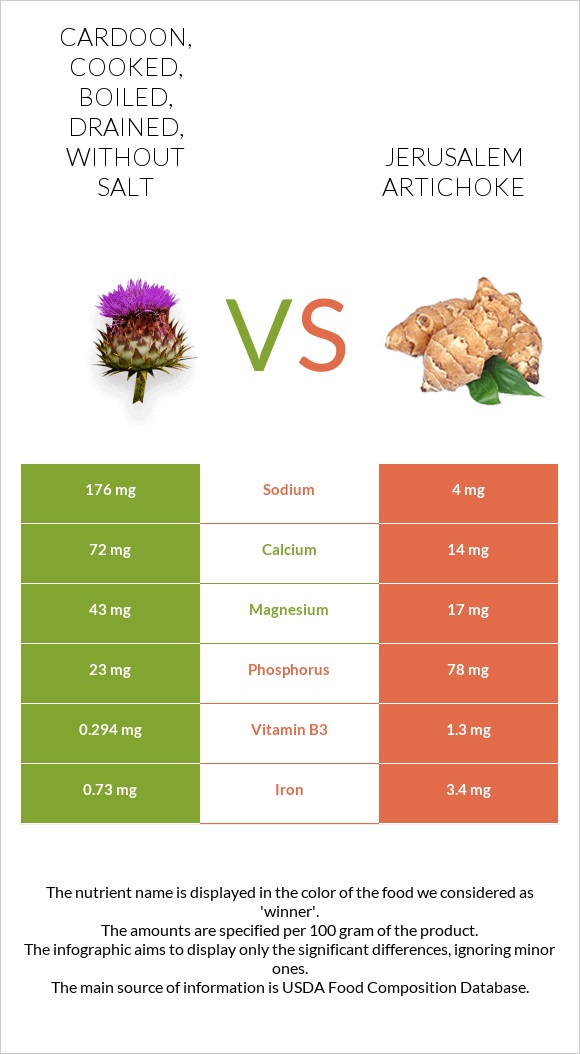Cardoon, cooked, boiled, drained, without salt vs. Jerusalem artichoke — In-Depth Nutrition Comparison
Compare
How are cardoon, cooked, boiled, drained, without salt and jerusalem artichoke different?
- Cardoon, cooked, boiled, drained, without salt is higher in magnesium and calcium; however, jerusalem artichoke is richer in iron, vitamin B1, phosphorus, vitamin B3, and vitamin B5.
- Daily need coverage for iron for jerusalem artichoke is 33% higher.
- Cardoon, cooked, boiled, drained, without salt contains 44 times more sodium than jerusalem artichoke. While cardoon, cooked, boiled, drained, without salt contains 176mg of sodium, jerusalem artichoke contains only 4mg.
Cardoon, cooked, boiled, drained, without salt and Jerusalem-artichokes, raw are the varieties used in this article.
Infographic

Infographic link
Mineral Comparison
Mineral comparison score is based on the number of minerals by which one or the other food is richer. The "coverage" charts below show how much of the daily needs can be covered by 300 grams of the food.
| Contains more MagnesiumMagnesium | +152.9% |
| Contains more CalciumCalcium | +414.3% |
| Contains more ZincZinc | +50% |
| Contains more ManganeseManganese | +121.7% |
| Contains more SeleniumSelenium | +42.9% |
| Contains more IronIron | +365.8% |
| Contains more PhosphorusPhosphorus | +239.1% |
| Contains less SodiumSodium | -97.7% |
Vitamin Comparison
Vitamin comparison score is based on the number of vitamins by which one or the other food is richer. The "coverage" charts below show how much of the daily needs can be covered by 300 grams of the food.
| Contains more Vitamin AVitamin A | +500% |
| Contains more FolateFolate | +69.2% |
| Contains more Vitamin CVitamin C | +135.3% |
| Contains more Vitamin B1Vitamin B1 | +1011.1% |
| Contains more Vitamin B2Vitamin B2 | +93.5% |
| Contains more Vitamin B3Vitamin B3 | +342.2% |
| Contains more Vitamin B5Vitamin B5 | +309.3% |
| Contains more Vitamin B6Vitamin B6 | +83.3% |
All nutrients comparison - raw data values
| Nutrient |  |
 |
DV% diff. |
| Iron | 0.73mg | 3.4mg | 33% |
| Copper | 0.14mg | 16% | |
| Vitamin B1 | 0.018mg | 0.2mg | 15% |
| Phosphorus | 23mg | 78mg | 8% |
| Sodium | 176mg | 4mg | 7% |
| Vitamin B5 | 0.097mg | 0.397mg | 6% |
| Magnesium | 43mg | 17mg | 6% |
| Calcium | 72mg | 14mg | 6% |
| Vitamin B3 | 0.294mg | 1.3mg | 6% |
| Choline | 30mg | 5% | |
| Carbs | 5.33g | 17.44g | 4% |
| Vitamin B6 | 0.042mg | 0.077mg | 3% |
| Manganese | 0.133mg | 0.06mg | 3% |
| Calories | 22kcal | 73kcal | 3% |
| Vitamin C | 1.7mg | 4mg | 3% |
| Folate | 22µg | 13µg | 2% |
| Vitamin B2 | 0.031mg | 0.06mg | 2% |
| Protein | 0.76g | 2g | 2% |
| Zinc | 0.18mg | 0.12mg | 1% |
| Potassium | 392mg | 429mg | 1% |
| Selenium | 1µg | 0.7µg | 1% |
| Vitamin E | 0.19mg | 1% | |
| Vitamin A | 6µg | 1µg | 1% |
| Fats | 0.11g | 0.01g | 0% |
| Net carbs | 3.63g | 15.84g | N/A |
| Sugar | 9.6g | N/A | |
| Fiber | 1.7g | 1.6g | 0% |
| Vitamin K | 0.1µg | 0% | |
| Saturated fat | 0.012g | 0g | 0% |
| Monounsaturated fat | 0.02g | 0.004g | 0% |
| Polyunsaturated fat | 0.044g | 0.001g | 0% |
Macronutrient Comparison
Macronutrient breakdown side-by-side comparison
Protein:
0.76 g
Fats:
0.11 g
Carbs:
5.33 g
Water:
93.46 g
Other:
0.34 g
Protein:
2 g
Fats:
0.01 g
Carbs:
17.44 g
Water:
78.01 g
Other:
2.54 g
| Contains more FatsFats | +1000% |
| Contains more WaterWater | +19.8% |
| Contains more ProteinProtein | +163.2% |
| Contains more CarbsCarbs | +227.2% |
| Contains more OtherOther | +647.1% |
Fat Type Comparison
Fat type breakdown side-by-side comparison
Saturated fat:
Sat. Fat
0.012 g
Monounsaturated fat:
Mono. Fat
0.02 g
Polyunsaturated fat:
Poly. Fat
0.044 g
Saturated fat:
Sat. Fat
0 g
Monounsaturated fat:
Mono. Fat
0.004 g
Polyunsaturated fat:
Poly. Fat
0.001 g
| Contains more Mono. FatMonounsaturated fat | +400% |
| Contains more Poly. FatPolyunsaturated fat | +4300% |
| Contains less Sat. FatSaturated fat | -100% |